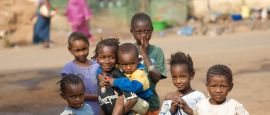Guinea: Doing business & staying in touch
Doing business in Guinea
Appointments should be made in advance. Lightweight suits and ties are worn by some business visitors, but these are not essential. A knowledge of French is helpful.
Given its resources, Guinea should not be suffering its current impoverished condition in which the annual per capita income is US$363 (2005). The majority of the population is engaged in subsistence agriculture, producing cassava and rice as staples, plus fruit, palm, groundnuts and sometimes coffee as cash crops. Fisheries have undergone major growth in the last 10 years.
The main part of the industrial economy is mining. Guinea has huge reserves of bauxite (perhaps one-quarter of the world's total) which account for more than 90% of export earnings; there are also substantial diamond deposits. Guinea also boasts massive hydroelectric power potential, some of which has been tapped.
The country's economic progress has, however, been hampered by the absence of the necessary legal, corporate and governmental machinery, allied to corruption and maladministration. For the time being, Guinea will continue to depend on substantial foreign aid, principally from France, although it is also deriving growing benefit from burgeoning regional co-operation: Cameroon, for example, processes much Guinean bauxite ore to produce aluminium.
Guinea is a member of both the Mano River Union (withLiberia and Sierra Leone) and of the Gambia River Development Organisation (with The Gambia and Senegal). The country is also a member of the West African economic community, ECOWAS.
Keeping in Touch in Guinea
The communication is relatively poor and outgoing international calls must be made through the operator. Limited telephone and fax lines are usually available 1800-0600.
• Newspapers include Horoya (official, daily), Le Lynx (satirical, weekly), L'Indépendant and La Lance (weekly), Journal Officiel de Guinée (official, fortnightly) and L'Evénement de Guinée (monthly).
• Radiodiffusion-Télévision Guinéenne (RTG) is the state-run national television and radio broadcaster.








 You know where
You know where